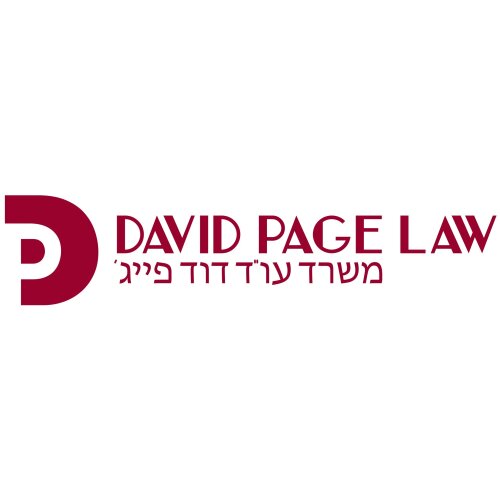Best Franchising Lawyers in Israel
Share your needs with us, get contacted by law firms.
Free. Takes 2 min.
Or refine your search by selecting a city:
List of the best lawyers in Israel
About Franchising Law in Israel
Franchising in Israel is a popular business model that allows individuals to operate branches of established brands and businesses. A franchise is essentially a right granted by the owner of a business (the franchisor) to another individual or business (the franchisee) to operate a business employing the franchisor's system, trademarks, and know-how. This form of business is governed primarily by contractual agreements between the parties, while certain legal principles under Israeli law apply to protect the interests of both franchisors and franchisees. Although Israel does not have specific legislation governing franchising, various laws related to intellectual property, competition, labor, and contractual obligations are crucial in managing franchised operations.
Why You May Need a Lawyer
Engaging a lawyer with expertise in franchising can help you navigate several scenarios:
- Contract Negotiation and Drafting: Lawyers ensure that the franchise contract is fair, comprehensive, and compliant with local regulations.
- Intellectual Property Protection: Legal expertise is necessary to safeguard trademarks and trade secrets involved in a franchise agreement.
- License and Regulation Compliance: A lawyer can guide compliance with local business registration, permits, and other legal requirements.
- Dispute Resolution: Legal support is crucial in addressing conflicts either between franchisors and franchisees or with third parties.
- Exit Strategies: Lawyers are essential in managing the transition during the sale of a franchise or termination of the franchise agreement.
Local Laws Overview
The key aspects of local laws that are particularly relevant to franchising in Israel include:
- Contract Law: Israeli contract law governs the franchise agreement, ensuring obligations and rights are clearly defined.
- Antitrust Regulations: The Restrictive Trade Practices Law impacts franchise agreements to prevent unfair competition and monopolistic practices.
- Intellectual Property Rights: Trademark Laws protect the franchisor’s trademarks and brand identity crucial to the franchise agreement.
- Consumer Protection Laws: Protect consumers in franchise operations, ensuring fair trade practices are upheld.
- Employment and Labor Laws: These laws govern relationships between franchisee employees and the functioning of the franchise business.
Frequently Asked Questions
What is required to start a franchise in Israel?
You need to draft and sign a franchise agreement, register the business as per local laws, and comply with any industry-specific regulatory requirements.
Are franchise agreements regulated in Israel?
Franchise agreements are primarily governed by Israeli contract law and other relevant legal frameworks, but there is no specific franchise regulation law.
What rights do I have as a franchisee?
Your rights are determined by the franchise agreement, including operational terms, the use of the franchisor’s system, and protections under general contract law.
Can a franchisor terminate the franchise agreement at will?
No, termination must comply with the terms set out in the franchise agreement, subject to local contract law provisions regarding fair termination processes.
How can I ensure that my franchise agreement is fair?
Seek legal advice to review and negotiate the terms of the franchise agreement to ensure fairness and protect your interests.
What costs are typically involved in franchising?
Costs can include an initial franchise fee, ongoing royalties, marketing contributions, and costs related to setting up and operating the business.
Do I need to have a legal representative for a franchise dispute?
While not mandatory, it's highly advisable to have legal representation to navigate disputes effectively and protect your interests.
What happens if I want to sell my franchise?
You’ll need to comply with the terms set in the franchise agreement and possibly negotiate terms with the franchisor for the transfer of ownership.
Are there any support programs in Israel for new franchisees?
There may be various business support programs offering guidance to new entrepreneurs, which can include franchisees, from governmental and private organizations.
How long does a typical franchise agreement last?
The duration of franchise agreements can vary significantly based on negotiations but often range from five to ten years.
Additional Resources
For more information on franchising in Israel, the following resources can be helpful:
- Israel Patent Office: Responsible for intellectual property registration and protection.
- Ministry of Economy and Industry: Provides resources for business regulation and support.
- Israel Antitrust Authority: Oversees fair competition laws and practices, including franchise agreements.
- Local Chambers of Commerce: Offer networking, advisory services, and program support for businesses.
Next Steps
If you need legal assistance in franchising, consider the following steps:
- Research Qualified Lawyers: Look for lawyers specializing in franchising and commercial law in Israel.
- Schedule Consultations: Reach out to potential legal representatives to discuss your franchising needs and get a sense of their expertise and compatibility.
- Evaluate Legal Advice: Assess the advice provided, comparing it with your commercial objectives and any specific concerns you have.
- Formalize Representation: Once satisfied with your choice, formalize your engagement with the chosen lawyer to assist in your franchising endeavors.
Lawzana helps you find the best lawyers and law firms in Israel through a curated and pre-screened list of qualified legal professionals. Our platform offers rankings and detailed profiles of attorneys and law firms, allowing you to compare based on practice areas, including Franchising, experience, and client feedback.
Each profile includes a description of the firm's areas of practice, client reviews, team members and partners, year of establishment, spoken languages, office locations, contact information, social media presence, and any published articles or resources. Most firms on our platform speak English and are experienced in both local and international legal matters.
Get a quote from top-rated law firms in Israel — quickly, securely, and without unnecessary hassle.
Disclaimer:
The information provided on this page is for general informational purposes only and does not constitute legal advice. While we strive to ensure the accuracy and relevance of the content, legal information may change over time, and interpretations of the law can vary. You should always consult with a qualified legal professional for advice specific to your situation.
We disclaim all liability for actions taken or not taken based on the content of this page. If you believe any information is incorrect or outdated, please contact us, and we will review and update it where appropriate.
Browse franchising law firms by city in Israel
Refine your search by selecting a city.
















